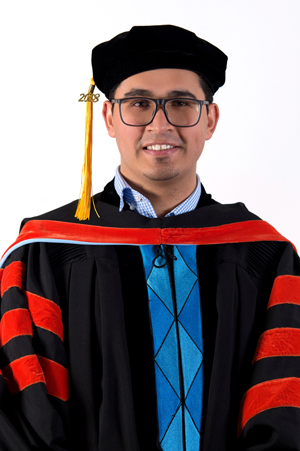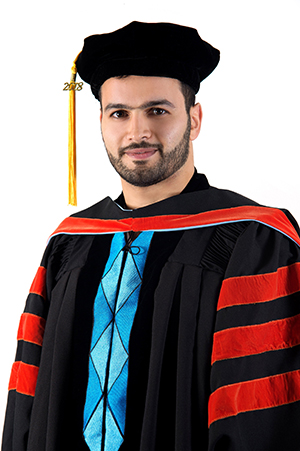
Sustainable environment graduates join HBKU’s growing alumni network
HBKU has reached a landmark milestone this year as it graduates two of its Doctor of Philosophy (PhD) students, who have spent the last three years studying and researching environmental technologies at the core of sustainable development. Two remarkable graduates, Ahmad K. Fard and Yehia Manawi from College of Science and Engineering (CSE), constitute the University’s inaugural cohort of PhD students.
Qatar’s relentless effort to drive research and innovation can best be witnessed through Qatar Foundation for Education, Science and Community Development’s (QF) homegrown university, Hamad Bin Khalifa University (HBKU). Even more remarkable was CSE hosting the first-ever PhD thesis defense of HBKU.
Students are required to present and defend their research to a PhD dissertation committee comprising internal faculty members and external delegates that are specially invited to judge the event. The committee members are themselves subject-matter experts and doctors in their respective fields and have the task of reading the dissertation, listening to the defense, and making suggestions for changes and improvements. Throughout the hours-long event, committee members ask students comprehensive questions about their thesis position while the PhD candidates are required to clearly and logically argue their stance and provide research support that supplements their conclusion.
 “Three arduous years of following a stringent schedule were worth it,” according to Ahmad K. Fard, one of two doctoral graduates at CSE and a Class of 2018 alumnus. His PhD project was motivated by his drive to play a contributing role in the search for an alternative source of water in Qatar through the development of new water treatment technologies. He said, “As we all know, water scarcity is a global issue. This issue is much more severe in Qatar as the country is located in an arid region with no source of freshwater and very limited rain – this is reflected in Qatar identifying water security as an area of critical national priority in its four Grand Challenges.”
“Three arduous years of following a stringent schedule were worth it,” according to Ahmad K. Fard, one of two doctoral graduates at CSE and a Class of 2018 alumnus. His PhD project was motivated by his drive to play a contributing role in the search for an alternative source of water in Qatar through the development of new water treatment technologies. He said, “As we all know, water scarcity is a global issue. This issue is much more severe in Qatar as the country is located in an arid region with no source of freshwater and very limited rain – this is reflected in Qatar identifying water security as an area of critical national priority in its four Grand Challenges.”
“During the course of my doctoral studies, I supplemented all theoretical work with research at HBKU’s Qatar Environment and Environment Research Institute. There, I worked with scientists who today are at the precipice of developing new technologies to solve the most critical water-scarcity issues in Qatar. As such, the work I conducted throughout my PhD program trained me to contribute meaningfully to ongoing research projects, whose success may carry far-reaching implications for both the country and the region.”
Successful academic pursuits are not only important for the development of one’s own future – instead, all research findings that students come across throughout the process of completing their theses carry the potential to facilitate advances within the industry.
 HBKU’s vision is what drove CSE’s student, Yehia Manawi, to complete his PhD. Having made his home in Qatar, his passion to instigate uplifting change through innovation and research was what inspired him to pursue doctoral studies in sustainable environment as his focus. He said: “Currently, Qatar employs mainly thermal desalination to produce freshwater – as is the case in many other markets in the Middle East. This means that the factory plants have to first evaporate seawater to then condense it into freshwater, and this is a very energy-intensive process.”
HBKU’s vision is what drove CSE’s student, Yehia Manawi, to complete his PhD. Having made his home in Qatar, his passion to instigate uplifting change through innovation and research was what inspired him to pursue doctoral studies in sustainable environment as his focus. He said: “Currently, Qatar employs mainly thermal desalination to produce freshwater – as is the case in many other markets in the Middle East. This means that the factory plants have to first evaporate seawater to then condense it into freshwater, and this is a very energy-intensive process.”
“While pursuing my higher studies at HBKU’s CSE, I conducted my research at Qatar Environment and Energy Research Institute, and my PhD project dealt with the growth of advanced membranes for water treatment and seawater desalination. Such a transformative development would carry lower environmental impact, require less energy consumption and would be more sustainable in the long-run for both Qatar and the region.”
Ahmad K. Fard and Yehia Manawi were advised and mentored by Professor Muataz Hussien of CSE, who helped shape, refine and direct the students' respective areas of scientific concentration. In his capacity as their doctoral advisor, he shared his subject expertise with the then-candidates, helped them navigate experimental and technical challenges, and assessed their progress, and catalyzed their professional growth. Dr. Victor Kochkodan, senior scientist at Qatar Environment and Energy Research Institute, additionally provided Yehia Manawi support with key components of his doctoral coursework.





